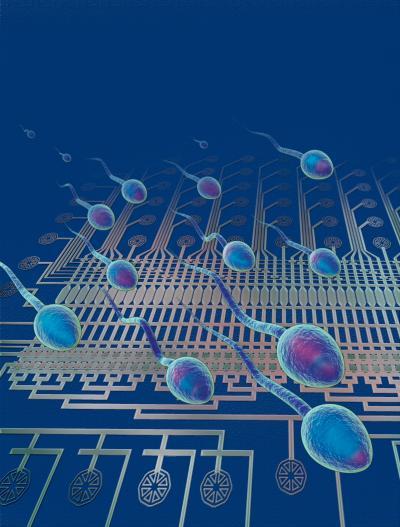Entire genome of human sperm sequenced for the first time - every sperm cell has a different genome -

Researchers at Stanford University have sequenced the entire genomes of 91 human sperm from a single man – providing insight into the genetic variation that naturally occurs in a single individual.
The project marks the first time the whole-genome of a human gamete has been sequenced.
Published in the journal Cell, the study offers more detailed knowledge about the process of genetic recombination – the method in which DNA from both a mother and a father blend together in the children they produce. Recombination facilitates both the breaking apart and rejoining of chromosomes during reproduction.
“We learned some really interesting details about how the body mixes together the genomes from parents to create new genomes for their potential children,” said Steve Quake, professor of bioengineering and applied physics at Stanford University as well as the study’s lead author. “That’s why every sperm cell has a different genome. Your body mixes to create unique genomes so your offspring have different genetic diversity.”
Providing greater detail
Quake and his colleagues isolated and sequenced nearly 100 sperm cells from a 40-year-old man with healthy children. They compared the sperm sequences with the man’s whole-genome sequence, ultimately allowing them to identify where and when recombination took place.
Until this sequencing project, scientists could only rely on genetic studies of population to estimate how often recombination occurred in sperm and egg cells as well as the amount of genetic mixing the process needed.
The Stanford study essentially confirmed what these previous studies theorized: Each sperm in the sample underwent 23 recombination events, or mixing events. However, the study also showed that the degree of genetic mixing varied greatly between individual sperm, as well as the frequency and severity of spontaneous genetic mutations. According to the researchers, the sequencing technique used in their study can provide a better guide as to what exactly happens during a sperm’s development.
“[Before this study], we have no way to catalogue the mutations and the recombination events of an individual,” co-author Barry Behr, professor of obstetrics and gynecology and director of Stanford’s in vitro fertilization laboratory, told FoxNews.com. “Once we get our understanding of these, we can map them and see how they change as a man ages. We could map these in healthy versus unhealthy people. We could map these in fertile and infertile people, and really get a better understanding as to what the fundamental makeup of a good sperm versus a bad sperm is.”
Read more: http://www.foxnews.com/health/2012/07/19/entire-genome-human-sperm-sequenced-for-first-time/?intcmp=trending

Researchers at Stanford University have sequenced the entire genomes of 91 human sperm from a single man – providing insight into the genetic variation that naturally occurs in a single individual.
The project marks the first time the whole-genome of a human gamete has been sequenced.
Published in the journal Cell, the study offers more detailed knowledge about the process of genetic recombination – the method in which DNA from both a mother and a father blend together in the children they produce. Recombination facilitates both the breaking apart and rejoining of chromosomes during reproduction.
“We learned some really interesting details about how the body mixes together the genomes from parents to create new genomes for their potential children,” said Steve Quake, professor of bioengineering and applied physics at Stanford University as well as the study’s lead author. “That’s why every sperm cell has a different genome. Your body mixes to create unique genomes so your offspring have different genetic diversity.”
Providing greater detail
Quake and his colleagues isolated and sequenced nearly 100 sperm cells from a 40-year-old man with healthy children. They compared the sperm sequences with the man’s whole-genome sequence, ultimately allowing them to identify where and when recombination took place.
Until this sequencing project, scientists could only rely on genetic studies of population to estimate how often recombination occurred in sperm and egg cells as well as the amount of genetic mixing the process needed.
The Stanford study essentially confirmed what these previous studies theorized: Each sperm in the sample underwent 23 recombination events, or mixing events. However, the study also showed that the degree of genetic mixing varied greatly between individual sperm, as well as the frequency and severity of spontaneous genetic mutations. According to the researchers, the sequencing technique used in their study can provide a better guide as to what exactly happens during a sperm’s development.
“[Before this study], we have no way to catalogue the mutations and the recombination events of an individual,” co-author Barry Behr, professor of obstetrics and gynecology and director of Stanford’s in vitro fertilization laboratory, told FoxNews.com. “Once we get our understanding of these, we can map them and see how they change as a man ages. We could map these in healthy versus unhealthy people. We could map these in fertile and infertile people, and really get a better understanding as to what the fundamental makeup of a good sperm versus a bad sperm is.”
Read more: http://www.foxnews.com/health/2012/07/19/entire-genome-human-sperm-sequenced-for-first-time/?intcmp=trending

No comments:
Post a Comment